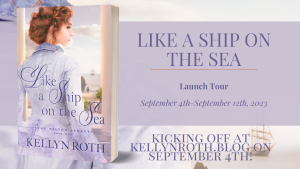
Today’s topic is one close to my heart … and one I kind of talked about in Monday’s post (okay, I totally RAMBLED about it in last Monday’s post), but this time will be less, “My heart behind it!” and more, “Here’s how to do it, in my opinion.”
With the caveat that I am not worthy enough for you to either take my opinion so seriously that you listen to none other OR get offended because our opinions vary. They’re called “opinions” for a reason. 😉
Before that, here’s the normal launch tour stuff . . .
About Like a Ship on the Sea
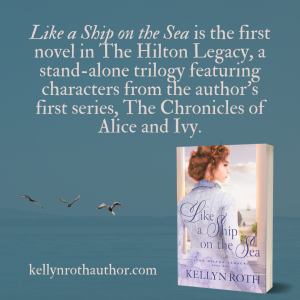 If God asks you to confront a storm, how dare you stay in the harbor?
If God asks you to confront a storm, how dare you stay in the harbor?
Lady Mary Cassidy O’Connell has a dream that can be summed up in three connecting ideas: a loving husband, adorable children, and a home of her own. Her mother’s lack of care makes life difficult for Cassie, and an escape is necessary. The plan? Marry Aubrey Montgomery, the man her parents have chosen for her, and find the peace she craves.
Unfortunately, Cassie is uneasy about marrying Aubrey. Her apprehension grows as she witnesses her dearest friend’s loving marriage take place. At this wedding, she catches the eye of Patrick Hilton, son of a wealthy American. Like Cassie, he’s also set to marry a woman chosen by his parents—only, Patrick claims, he is content with this choice.
Torn between her desire for happiness and the knowledge that God is leading her in a different direction, Cassie confronts the impossible decision. Is a loveless marriage of obligation better than being alone, or will she set sail on a voyage without a safe harbor?
Like a Ship on the Sea is the first novel in The Hilton Legacy, a stand-alone trilogy featuring characters from the author’s first series, The Chronicles of Alice and Ivy.
AMAZON ~ GOODREADS
About The Hilton Legacy

The Hilton Legacy will be a trilogy (with perhaps one standalone spin-off, depending on how I decide to do this!) set in 1880s and 1890s America and Europe.
The first novel, Like a Ship on the Sea, which is the one we’re celebrating today, features Patrick Hilton and his eventual love interest, Cassie. Of course, we know all about this novel!
The second novel, Like the Air After Rain, will feature Lorelei Hilton and her love interest and will primarily take place in England. There’s going to be a marriage of convenience angle that will be a lot of fun, methinks!
The second novel, Like Lightning in a Bottle, will feature Gwendolyn Hilton and her love interest and will primarily take place in England and America. This one is a little bit of a wild card, but we’re gonna have fun with it.
The Schedule
Monday, September 4th
“Why You Should Read Like a Ship on the Sea” by Kellyn Roth
Book Spotlight by Abby Johansen
Author Interview by Naomi Sowell
Tuesday, September 5th (LAUNCH DAY!)
“All the Launch Day Celebrations” by Kellyn Roth
Wednesday, September 6th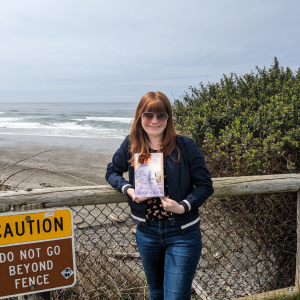
“About the Gilded Era” by Kellyn Roth
Thursday, September 7th
“Tackling Tough Topics with Tact” by Kellyn Roth
Friday, September 8th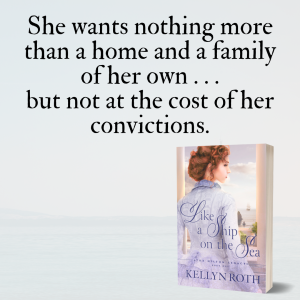
“A Guest Post by Alice Strauss” by Kellyn Roth
Book Spotlight by M.C. Kennedy
Book Spotlight by Bizwings Book Blog
Saturday, September 9th
“Introducing the Hiltons of Boston” by Kellyn Roth
Monday, September 11th
“How The Hilton Legacy Fits in with The Chronicles of Alice & Ivy” by Kellyn Roth
Author Interview by Amy Ullrich
Review by Pens, Pages, and Pulses
Author Interview by Jane Mouttet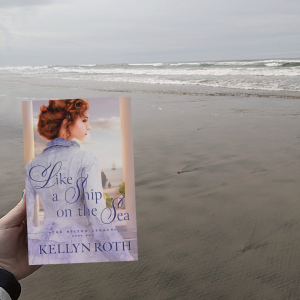
Book Spotlight by Rhys-Marie Whitnell
Tuesday, September 12th
“All About Book Two, Like the Air After Rain” by Kellyn Roth
Book Spotlight by Grace A. Johnson
Interview & Review by Saraina Whitney
The Giveaway
 Don’t forget to enter the giveaway! There will be a USA and International Winner, so even if you don’t live in my country, ENTER ANYWAY, because I made a prize just for you!
Don’t forget to enter the giveaway! There will be a USA and International Winner, so even if you don’t live in my country, ENTER ANYWAY, because I made a prize just for you!
US-Only Giveaway: a signed paperback copy of Like a Ship on the Sea, a themed candle, two bookmarks, three character art prints, a themed charm bracelet, and extra special bonus scenes.
International Giveaway: an ebook copy of Like a Ship on the Sea, extra special bonus scenes, a themed phone wallpaper, and the first chapter of book 2.
ENTER NOW!
Or paste this link into your browser: http://www.rafflecopter.com/rafl/display/cbb544c921/
The Bookish Tag
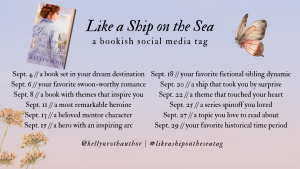
With the help of Grace A. Johnson (who is way too kind to me), I am hosting a bookish tag! This can be done on any social media profile (or even your blog) and is a fun way to join together to celebrate the launch! Starting today!
I’m doing the prompt on my Instagram and Facebook profiles, and I may try to repost some of these to Twitter, too!
The Prompts
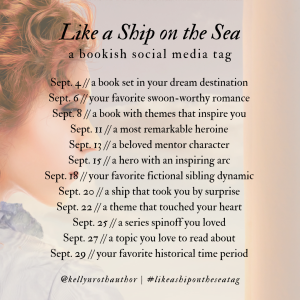 Sept. 4 // a book set in your dream destination
Sept. 4 // a book set in your dream destination
Sept. 6 // your favorite swoon-worthy romance
Sept. 8 // a book with themes that inspire you
Sept. 11 // a most remarkable heroine
Sept. 13 // a beloved mentor character
Sept. 15 // a hero with an inspiring arc
Sept. 18 // your favorite fictional sibling dynamic
Sept. 20 // a ship that took you by surprise
Sept. 22 // a theme that touched your heart
Sept. 25 // a series spinoff you loved
Sept. 27 // a topic you love to read about
Sept. 29 // your favorite historical time period
Rules
- There are prompts for every other weekday in September, but you’re welcome to share whenever you can and catch up at any time.
- Feel free to use any social media, including Instagram, Facebook, Twitter, your blog, and Youtube.
- Share about books that fit into the categories, and have fun!
- Don’t forget to use the hashtag #likeashipontheseatag and tag Kellyn (@kellynrothauthor on Instagram & Facebook or @kellyntheauthor on Twitter) to be shared!
Tackling Tough Topics with Tact
This Monday, I discussed my decision to tackle tough topics in Like a Ship on the Sea and all my novels. I dove deep into my past, into the way the Christian fiction world has both inspired and crushed me, and more.
This deeply personal post discusses a lot of the heart behind tackling the tough and taboo topics, the type of themes and events that are so often discussed in the Bible … but that Christians only speak about in hushed voices. Mental health struggles, sexual sins & healthy sexuality, the depths of loss & grief, and more.
That post discusses my story. This post is going to discuss a little more of the HOW TO (at least for me).
Now, don’t get me wrong. Though there are Christian readers and authors who are uncomfortable with taboo topics (and these are their personal convictions & is totally okay!) and who judge Christian authors for choosing to portray those topics (which I guess is their prerogative, but sometimes, especially when it’s theoretical, I see people taking it too far, making it sound like being clean = being free of tough topics, which is not true!) … yes, though there are Christians who are anti-taboo topic for ANY reason (and that’s fine) …
I know also quite a few Christian fiction authors doing exactly what I’m doing. And I’ve read them, and I love them. I’m not saying there aren’t Christian fiction authors who do this. There are a lot of them!
Some do them do it well and some don’t. For me, trying to write Christian fiction for the Lord, I want to do it well because it is important to “do everything heartily, as to the Lord and not to men.” So how does one do that? After studying authors who seem to do it right, after studying fiction for years, and after spending a lot of time in prayer, I feel like I have an idea of how that’s accomplished.
AN IDEA. I’m not saying this is how to do this. I’m not saying my process won’t change. I am saying this is how I do it now, and that this is a trend I see amongst great Christian fiction novels that discuss more difficult topics.
So here are a few practical tips for discussing any tough subject.
#1: Research, research, research.
Even if it’s a topic you have personal experience with (which is great … um, okay, in the sense that it will deepen your understanding of the topic), I recommend doing research to understand the minutia of whatever topic you’re discussing. Find books on the subject, both fiction and nonfiction. Interview people with similar experience. Understand what’s been said on the subject … and what could be said by you to add to the topic or to at least shed a different light on it. Don’t just rely on your imagination!
And while you research, pray. Pray for great resources. Pray for understanding and discernment, as sometimes a personal opinion may influence whatever resource you’ve found. Pray that you will have a compassionate understanding of the subject and that your own opinions will fade away, allowing you to view the subject with objective eyes. (If nothing else, an author MUST be objective.)
And as you go, make tons of notes!
#2: Decide on your target audience early on.
This will help you decide how much you’ll include, how you’ll discuss the topic, and what kinds of things you actually need to research. If you’re discussing mental health subjects in a way that’s appropriate for children, that will be different than the way you write for a teenager which will be different than the way you write for adults.
And even within certain audiences, there will be variances. A ten-year-old will understand things much differently than a six-year-old. And a fifty-year-old is wildly different from a thirty-year-old who is wildly different from a twenty-year-old. Coming up with a specific “target reader” may be a good idea.
For me, I’m writing for young women aged 16-25.
As noted in my last blog post:
My novels are not “clean for all audiences.” Sure, I write “clean fiction” if you mean “no sex scenes, no graphic violence, no cussing,” but not in the sense of “no references to sexuality,” “no adult-only topics covered,” “no darkness whatsoever.”
The Bible is meant to be read by all audiences, yes, but all audiences shouldn’t be encouraged to deeply dive into, for instance, sexual ethics based entirely on Biblical understanding. And the Bible is great, because you can totally read and understand it as a child … and then go back as a teenager and get something more out of it … and then go back as an adult and get even more out of it.
But we are not God, and we are not writing the Bible! That is an unrealistic expectation. As a married adult, I am both able to read the Bible in a way that deeply digs into what it says about, for instance, sexuality … and then portray these factors that in my books and in my characters’ relationships …
WITHOUT showing sexual scenes, writing in such a way that the reader’s mind will feel dirty or their thoughts and feelings edge toward sexual arousal (which is the main purpose of smut – it is meant to arouse, to create sexual feelings outside of marriage, which is wrong), or dishonoring God.
Yet that does not mean my book is literally the Bible. Some topics in my books are not kid-safe because I confess I am writing for adults. The Bible is written for everyone. But the Bible literally has power, and if you believe you can mimic that power, dear author … well, I can’t convince you otherwise, but I personally am afraid I can’t mimic that power. I’m just me, not God, and the gifts He has given me do, um, not lend toward Bible-writing, somehow.
And really, what’s happened to me is, God has said, “Kellyn, I want you to write for specific people. Leave the audiences you can’t reach for me. You aren’t everything to everyone. You are THIS AUTHOR for THESE PEOPLE.”
The key is ALWAYS balance … and audience. I wouldn’t hand Like a Ship on the Sea to anyone under 16 because it does briefly and tastefully discuss some sexual topics, and there is an obvious undertone of attraction between my main leads, especially after they are married. It’s not explicit. In fact, because of my personal tastes, it’s “cleaner” than most of the Christian romances out there in terms of “how much is described.” (I’m not really opposed to a higher level of kissin’, and most of my favorite authors write more. But I just … am an awkward kiss-writer. I get the point across other ways.)
#3: Figure Out How You’ll Personally Touch on These Topics
For me, this inevitably means utter honesty … and a light touch that doesn’t leave the reader stuck in darkness for too long. I believe in being straightforward when it comes to tough topics, and I also believe in not purposefully choosing to drag the reader in the darkness for ages.
I’m going to quote Monday’s blog post again:
I believe some authors who discuss such topics can struggle because they try to write about things that are tough to talk about in poetic ways OR they really lean into the grittiness.
Neither feels appropriate to me.
One belittles pain and sin into something sort of artistic and dramatic, which honestly can sometimes make it seem attractive … or too light … or too dark. (Art is funny that way. It can be understood all sorts of ways. But I don’t believe sin should be an art, truly.)
The other embroils the reader in darkness without a steady thread of light.
I think sensitive topics deserve a light but honest touch.
When I say sin here, by the way, it’s worth noting that sin is usually (even always?) what causes tough/taboo/etc. topics to even exist. Whether it’s because sin is in the world, creating death and illness and MORE (yay …) or because people are sinning and causing pain for themselves or others, sin is the root cause of all the “taboos.”
And you know, I get being uncomfortable with sin. So I understand WHY these are taboo, why we are having a tough time sharing about and reading about these topics. And even WHY some people don’t want them discussed at all. I mean, sin is not fun! (More on that later!)
To kind of show you how this comes off to readers …
Here are some quotes from recent reviews:
The faith aspect of this story SHONE. It’s not “preachy,” if you’re taking that to mean sermons in a fiction book. It’s faith meeting real-world issues like suicide and miscarriage and struggling to follow where God is leading and feeling lost and not knowing where to turn to. It’s powerful, and I think every reader will find something to relate to and gain encouragement from.
There are a lot of heavy themes discussed but handled in a Biblical, real way. And the “discussions of a sexual nature” were handled as tastefully as they possibly could’ve been. In fact, the romance too was written in such a wholesome way. The few kisses weren’t described at great length, though they were still satisfying and the physical attraction was unmistakable. Think Jane Austen + an explicitly Christian worldview + Kellyn Roth’s penchant for blunt straightforwardness in otherwise-thought-of-as-delicate subjects. It’s quite refreshing.
(From a review of Like a Ship on the Sea on Goodreads)
Kellyn handles each topic with the warranted delicacy and none are graphic or explicit. But neither does she sugar coat the pain that comes from these difficult situations.
(From a review of Like a Ship on the Sea on Goodreads)
Some might even be downright uncomfortable with Kellyn’s trademark bluntness in certain matters, especially if you’re a newcomer to her books, but regardless, she always handles it in a tactful, appropriate way, because these are matters worth discussing!
(From a review of Like a Ship on the Sea on Goodreads)
And this brings me to my next point, which relates to WHY I choose this approach.
#4: Sin is not art.
Sin is not beautiful. Not even achingly beautiful.
Sin is drudgery. Sin is ugly. Sin is not worthy of our focus.
The Lord is the Creator of the best art! He is beautiful, and He should be our main focus.
This sort of emo-teen idea that there’s something cool about being “morally gray” or a bad boy, that by becoming “good” we lose our edge or personality, is ridiculous. We are at our most individualistic and our most interesting when we’re following God’s commands, when we’re “being good.”
And sadly, Christians do not do a good job portraying this, perhaps because we don’t understand it. One of the most frustrating aspects of my childhood was reading Elsie Dinsmore and watching every “rebellious & disobedient” character get formed into a little Elsie clone.
Why? Because Martha Finley seemed to think because Elsie was the essence of goodness, to write good characters, she just had to copy and paste. I think there was a character named Lucinda (or some form of Lucy … Lucella? Or am I thinking of someone else entirely? Anyways, I think her last name was Raymond, right? She had the … ship captain dad who married Elsie’s daughter? Gosh, this series was so complicated) who in particular upset me, because she lost her actual personality in exchange for “being good” and reforming from some of her rather bratty traits.
But the truth is, even when we’re deep in our sins, we’re often accidentally reflecting aspects of God’s creation in us. We can’t help it. Oftentimes, what our extremism turns into a sin may eventually be tamed into a strength (maybe you’ve overbearing and that turns into strong leadership skills), or we may pursue the opposite (maybe you’re a liar and you become endlessly dedicated to the truth).
The things I’ve experienced in the past – for instance, typecasting myself into sinful situations (“I’m unfeeling; I lack empathy; I’m too blunt; there’s no way I can change this about myself; I’m despairing of ever being a ‘proper Christian'”) – have all returned to me (“I’m not going to give into this idea that individuality means you can’t follow the Lord when really our true individuality can only be found in Him … and I don’t want anyone else to, either!”).
Because our pain has purpose. Honestly, it often has roots in our calling; it is the preparing grounds for something greater. That tragic backstory, the effects of sin … in the end, the Lord can turn what the world, what sin, meant for evil … and make it good.
And here’s what the means: as a character moves through their arc and, in Christian fiction, comes closer to God (or comes closer to their “truth,” in all fiction), they will become more and more themselves. They will blossom before your eyes!
That’s probably one of my favorite bits of Like a Ship on the Sea … both Cassie and Patrick really become their true selves as they pursue God more passionately. This is how it should be. We should all be becoming more brilliant with joy, with personality, and with strength as we become more like Christ.
It’s not prosperity gospel because it ain’t about physical prosperity. A strong, joyful, godly character (meaning “the mental and moral qualities distinctive to an individual”) is something no one can take away from you, unlike physical blessings like wealth, good health, et cetera.
That said, although I don’t believe that sin is pleasant, and though I believe we should be honest in our portrayal … there is something powerful about knowledge. Being straightforward is good … but only if you’re not spending so much time in darkness that you don’t leave room for hope.
Only if you’re causing readers to ask the right questions, answering them in the right way (as much as is appropriate for your story, genre, and audience), and not choosing to drag their minds through 100,000 words of “this life sucks.”
#5: Knowledge is power, and power must be used wisely.
We don’t want to use our portrayal of sin to cause people to sin. That’s a common concern I hear amongst Christian writers and readers, and I get it. I really do. And that’s why I’m writing this section.
A lot of this comes down to audience. Discussing sexual topics with children is inevitably going to raise more questions than answers. You don’t want a ten-year-old coming to their mom after reading their book and going, “Hey, so, this author said that sexual pleasure in marital relationships is good and holy … what is sexual? What is pleasure? What is marital? What is relationships?”
And though as a writer, you want to be raising questions … those are probably not the questions a ten-year-old needs to be asking. Actually, a ten-year-old (as noted) will not have the words to ask these questions, and I think that’s going to lead to them NOT ASKING THEM which is … not good. Because you are essentially causing the exact opposite problem of what I hope to achieve my books – creating repression. We don’t want repression. It’s bad, even (or especially?) for Christians.
We want to inspire only what will be actionably helpful to our audience. We want to ask the questions out there in the open, at the front of our minds, rather than letting them mill about and become sinful in the silent, dark places.
And, at least in my opinion, there are some things that will never be helpful.
To use a specific example, if you’re writing out a sexual scene where you walk the reader, no matter how mature, play by play, through a married couples’ sexual activities, you are not going to be helpful because – though it’s not a sin for these concepts to exist, to acknowledge that they exist, or for the characters to do them – it is a sin to engage in another person’s sex life, even if they are fictional. Plus it’s bad for the brain!
That said, different audiences are going to react differently to different things that are not in and of themselves wrong or anti-Biblical, but may be wrong for the audience depending on how you write them.
For a ten-year-old, having two characters frankly discuss their sexual relationship would probably be harmful no matter how you spin it. A ten-year-old is not ready for that knowledge.
For a twenty-year-old who is on the verge of entering adulthood and dating, it might help them understand why sexual intimacy in marriage is so much better than any other variation that the world can come up with … or it might cause them to stumble as they desire the relationship these characters have & (of their own volition) choose to engage in other sexual activities to chase that feeling.
For a twenty-five-year-old navigating the first years of their marriage, it might be encouraging to see a couple caring about their sexual relationship and prizing it enough to make it their focus. It might have them asking hard questions about how their own relationship is progressing, or how it’s not progressing.
But even a twenty-five-year-old (or an eighty-five-year-old) may have personal convictions, and if they read your book, no matter how carefully written, if it makes them uncomfortable because it violates their personal convictions, they’re not going to like it. As a reader, I hope they’ll have the common sense to take responsibility for having read the book, but some of them are not going to. Some of them are going to react with a, “This book is not Christian enough because of XYZ reasons!”
And I get why. I know that icky feeling of “that shouldn’t have been in my mind” well. I understand how it makes you want to lash out and assign blame. And we can’t avoid that as Christian fiction authors, universally speaking, because everyone has different levels of comfort.
So here’s what you do to try to mitigate (though not eliminate) these effects as an author writing about tough themes for a Christian audience.
It all comes down to appropriate marketing.
But the reader needs to have the personal responsibility of not reading the book if it’s going to harm them, too! Let’s look at that twenty-year-old again. If she, unmarried and inexperienced, would find sexual discussions, no matter how gently written, to be harmful, why is she reading books that feature sexual discussions?
Your only responsibility as an author is to accurately market, but beyond that, if the reader hops into the story without any context and expects it to perfectly fit her needs, and it doesn’t, then she can put the book down … or she can continue to read it and sin. And that’s not really within the author’s control.
That’s why I rarely market my books as “clean” anymore. I want to do my due diligence. And I usually try to put content warnings wherever I can and make it clear with the cadence of the blurb and so on that this is a work of adult fiction. One should hopefully, therefore, expect adult topics of conversation.
Because at the end of the day, we don’t MAKE other people sin as long as we are not deliberately urging people to go against their convictions. That is what the Bible specifically advises against.
We don’t want to invite our friends over to dinner and force them to eat snails if they don’t believe in eating snails. We wouldn’t drag a person who wasn’t comfortable with the subjects discussed in our novels to a book club or hand them a copy if they had specifically said they would not read the novel. And we don’t judge them for that.
So basically, “not causing someone to stumble” would entail:
- Not trying to talk people out of their personal convictions or imply that their personal convictions are wrong. (Yes, even if they wear jeans! YOU STILL CAN’T JUDGE THEM.)
- Not trying to cause believers to stumble on the path they have chosen. (Yes, even if you really want to share your great snail souffle with them, YOU MUST RESTRAIN YOURSELF. Even if your snail souffle is life-changing. Even if it’s the one thing standing between them and greatness. PUT DOWN THE PAN. It’s none of your business!)
A helpful way of thinking about it?
God wants us to help other Christians stick to their personal convictions—even if we don’t feel personally convicted about that thing being sinful. We should always avoid tempting fellow believers into sinning (Romans 15:1).
For example, let’s say your friend has a problem with a certain kind of music. Maybe that music is not inherently evil. But if it is something that would cause your friend to stumble in his faith, it is your duty as a Christian friend to make sure that you are not responsible for exposing him to that kind of music.
But … here’s another way of viewing the stumbling block situation that may shed light on why I’m not too worried about that with my novels. Essentially, the issue is not “if someone thinks it’s a sin, you must stop doing it immediately!” … it’s “if you’re going to drag someone else who believes otherwise into it, it becomes a sin.”
In the age of the internet, when everything is so wildly accessible to everyone, it must go both ways. The reader is responsible for following their own convictions. The author is responsible for accurately disclaiming when sensitive topics are discussed in their work or on their platforms.
Let’s take this to the logical extreme. If you are going out for a night of drinks on the town (or, because you’re a Christian, a couple drinks that won’t lead to drunkenness, which is not forbidden in the Bible!), and you invite a friend who is against drinking period, but you say to her, “We’re going to be drinking, and you don’t have to come, and if you do, you don’t have to drink,” and that friend still comes, and they sin by going against their convictions and drinking … Well, that’s not wrong.
But if you said to your friend, “You can come along and not drink” and then spent the next couple hours cajoling them to drink … you’d better line up to take some blame. And if you said, “You should come along and drink because your convictions are silly,” well, BLAME. BLAME ON YOU. BLAME ON YOUR WHOLE FAMILY. BLAME ON YOUR COW.
YOU, my friend, YES YOU, have become the bad kind of Proverbs friend. And that sucks. I wish you’d stop. Because evil companions are annoying, and I’d like to invite you to be unfriended.
That said, the fact that you drink when your friend chooses not to does not make you a bad individual. (Maybe I should’ve used a less controversial one, but meh. Drinking in small amounts is not wrong. Jesus made wine. There. I said it. And no, again, this is not to say that your personal convictions are wrong, BUT you owe me the same benefit of the doubt about my personal convictions as I owe you. My personal convictions – despite having had one alcoholic beverage in my entire life and it had like 0.00000001% alcohol – are that it’s not sinful.) Drinking in front of your friends? Teasing them for not drinking? Sending photos of you enjoying a margarita on the beach and looking sooooo much cooler than them? Yeah, let’s put a stop to that RIGHT NOW.
That’s not friendship. That’s bullying. We don’t like bullies.
And this applies to your behavior as an author. Don’t comment on reviews or have a pity party with your friends if someone’s convictions vary from yours. Don’t expect everyone to like your book. Don’t get all up in arms and blame the reader when they feel like your book doesn’t line up with their personal standards.
Sure, they could’ve worded it more nicely. But reviews are all about personal convictions and standards and enjoyment. And guess what? Even if they could’ve avoided it, even if you did your level best to market accurately and disclaim appropriately, there are going to be readers who just didn’t pay attention.
And I get it. It sucks. Every single launch I have features at least a half a dozen readers who are not my target audience talking about how my books overstepped their boundaries. And that’s really good, because we need all types of Christians in this world, and I’m grateful for them.
Further, it helps me tighten up my marketing for next time, understand what I might disclaim better, and helps readers who feel similarly to avoid my books.
Sometimes they state it in ways that I know will not be helpful to most readers – because believe it or not, “fade to black sex scene” has a lot of different meanings from “lusty kissing & undressing leads to the couple falling onto the bed dot dot dot” (I don’t think I’ve ever written anything remotely like this?) to “they kissed once & then the camera shut off but now she’s pregnant so maybe you can guess what happened” (… guilty as charged) – but that’s okay because if God wants my books to be read, He’s going to make it happen. One review or a dozen is not going to make a difference in God’s plan. In fact, it’s a part of God’s plan!
So basically, all y’all CHILL OUT. Everyone’s freaking out. STOP. FREAKING. OUT. *SHAKES YOU* YOU. WILL. BE. OKAY. WHY DON’T YOU BELIEVE EVERYTHING WILL BE OKAY WHEN I SAY IT IN THIS CALM AND REASSURING VOICE!!?!?!
Anyways, you get my point.
Also, all y’all keep talking about Christian fiction books that are too smutty, and just asking for a friend, but like, where do you find these …? Okay, okay, I’m joking. I don’t want to read Christian smut.
But man, am I curious … like, what does it entail? I guess I watched Redeeming Love, but I haven’t read the book, so is the book just like … is it the same? But like, those scenes in a book might’ve been easier to pull off because having Angel be unclothed in a book is a heck of a lot different than having her be unclothed in a movie, so like? Was it …?
Never mind. I don’t want to know.

TTFN!
~Kell~
P.S.
WHAT ARE YOUR THOUGHTS? Please tell me someone found this helpful or I am going to be sad. ALSO, this turned into a lot less of a practical article than I intended, so I’ll have to write another one that actually … delves into the topic I promised. I had so much fun with it, though! I love rambling. Anyways. Catch y’all later.

Are you interested in getting to know me & my books better?
I want to invite you to my super secret club. I mean, it’s not really a secret, because I’m telling you about it now, but here goes.
Join Mrs. Roth’s Society Column, my street team! We’d love to have you along for the ride!


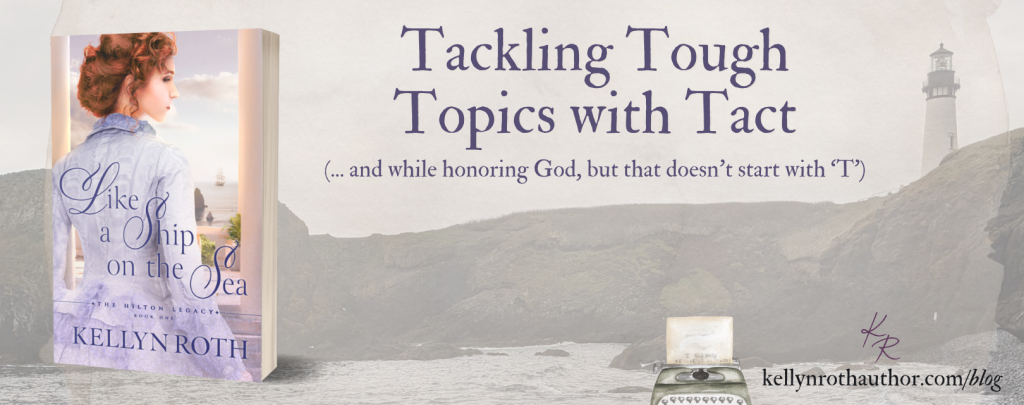

7 Responses
BRING ON THE RAMBLES!!! Practical or no, this was still epic. *applauds*
I totally agree in the importance of appropriate marketing—something I’m trying to get in order in my own writerly life as I’m seeing more and more people mislabeling what I write and consequently getting confused/upset/disappointed. ANYWAY.
And because I’m that kind of person…the book version of Redeeming Love is (1) leagues better than the movie and (2) easier to pull off on-page than on-screen, for sure. It’s still heavy, but not graphic at all. (Francine Rivers is the kind of blunt writer that doesn’t give you detail, just tells it to you straight, so if you, reader, are coming up with detail…that’s on you.) So now you know, even thought you didn’t want to.
Aw, thanks, Grace! I definitely had fun with it. And yeah, it’s a challenge to find a way to communicate what you’re selling … and sometimes readers don’t help.
Heh, yeah, I’ve heard that. I don’t know that I’ll ever read it, because it was the plot I really didn’t like, but who knows?
This was SO HELPFUL. I really needed this post!
Aw, thank you, Saraina! I’m so glad that some helpfulness came through!
Oh man, thank you for this post, especially the part about personal convictions because people take that passage out of context all the time to justify shaming women for wearing jeans. Like, I don’t care if you’re personally skirts/dresses only, but acting like it’ll stop lust is unrealistic and just not true when you look back through history, and even today’s sady and age, at all the women who did dress modestly and yet were/are still victims of sexual assault and abuse. (Not to mention little girls who have no idea what’s happening to them!)
It also pins all the responsibility for avoiding lust on the woman and eschews the man of his responsibility not to view women as objects. (And yes, I know it can happen the opposite way too)
I hate it when people take verses out of context, especially because the way some of those out-of-context verses have been twisted to justify all sorts of wrongdoings throughout history, and all sorts of unbiblical, unorthodox stuff.
Anyway, this post has got me thinking about some of my stories…there’ll probably be different target audiences for each, but in some ways, I hope to at least have similarities between audiences simply because of how connected I’ve made some of my series…okay now I’m rambling so I’ll get off my soap box, heh.
Ah, I’d not heard that one (though I’d heard the verses used to justify very similar things lol), but I can’t say I’m surprised in the slightest. It’s certainly an interesting take!